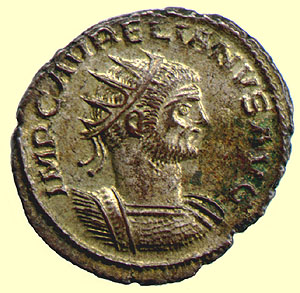 Contents -
Previous Article -
Next Article
Contents -
Previous Article -
Next Article
Aurelian was a popular soldier-emperor who was, like Claudius II before him and Diocletian after him a native of Illyricum. He became emperor after the death of Claudius Gothicus in the great plague of the Third Century. He was popular and a good general, though some of his troops considered him a harsh disciplinarian. Almost immediately after his elevation to the throne, he had to deal with an invasion of Northern Italy by the Alemanni, a German tribe who were plundering the countryside around Milan. He defeated them and chased them back across the Danube. It was a sign of these troubled times of barbarian invasion that, in the vast territory under the control of Rome, invaders could strike so close to the heart of the empire. Aurelian spent a large part of his reign crushing the invading barbarians that had found it so easy and profitable during previous reigns to cross into Roman territory to raid rape, burn, and plunder. After the reign of Aurelian, barbarian problems still had to be dealt with but the reforms of Gallienus, Aurelian, and Diocletian in the army and government made it harder for the barbarians to get away with their raiding.
Aurelian also brought all the rebel empires back under the control of Rome. The Gallic Empire formed by Postumus was now ruled by the weak Tetricus, who decided to throw himself on Aurelian's mercy before Aurelian decided to send an army after him. Egypt was retaken, and he finally defeated and captured the courageous Zenobia, Queen of Palmyra after she had outwitted him in several battles. Aurelian was merciful to his enemies in an age when the usual result of failed rebellion was a quick and violent death. After having walked in Aurelian's magnificent triumph in golden chains, Zenobia, Tetricus, and Tetricus' son Tetricus II Caesar were pardoned and even treated quite generously by Aurelian.
Aurelian was another popular emperor who was murdered by army officers in spite of being well liked and respected. It seemed that in A. D. 275 Eros, the emperor's personal secretary, had done something to cause Aurelian to become angry. Eros feared that Aurelian was about to have him put to death, so he resorted to treachery to save his skin. He forged a list of officers supposedly about to be executed by Aurelian and circulated it amongst the troops. Some of these officers plotted together and assassinated Aurelian. By the time Eros' deception was found out and he was killed by the enraged officers, it was too late and Aurelian had already been killed.
Aurelian made many changes during his reign that resulted in a stronger army and imperial government. He improved on the fast mobile field cavalry of Gallienus. In order to ease the economic hardships of the people, Aurelian forgave many of their debts and expanded the free food distributions to the poor to include bread and pork. He improved the appearance of the coins and put a little silver (about five percent) back into them. There is mention in some of the contemporary historical accounts of a revolt by the mint workers, which Aurelian crushed. No reasons for this revolt are known.
Aurelian also tried to put an end to the endless cycle of raising and then murdering an emperor by the army. He instituted a state religion in which the emperor and the sun god Sol were worshipped. The worship of Sol and Mithras were favorite cults of the army and Aurelian hoped to ensure loyalty by making himself a god and a priest. Both Diocletian and Constantine continued to promote this worship despite Constantine's later conversion to Christianity.
Go to next article on Emperor Vabalathus
Go back to previous article on Emperor Quintillius